Module 12 Save our world Unit 3 Language in use 课件(33张PPT,无音频)
文档属性
| 名称 | Module 12 Save our world Unit 3 Language in use 课件(33张PPT,无音频) | 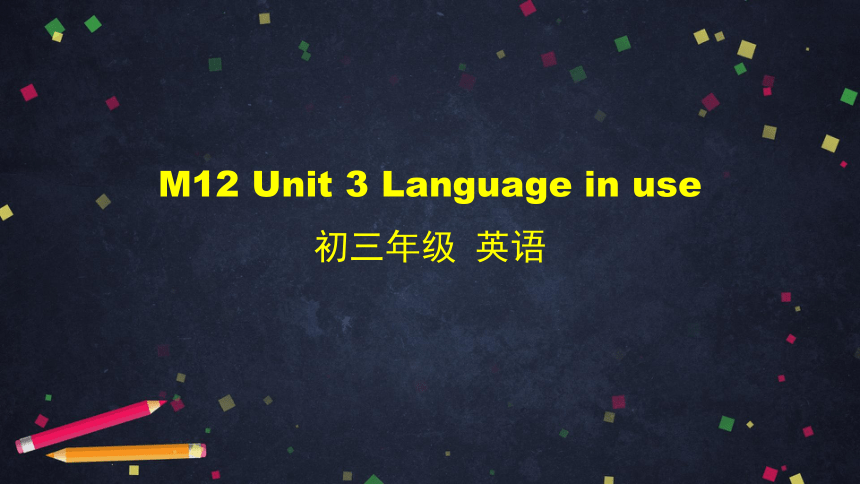 | |
| 格式 | pptx | ||
| 文件大小 | 875.9KB | ||
| 资源类型 | 教案 | ||
| 版本资源 | 外研版 | ||
| 科目 | 英语 | ||
| 更新时间 | 2021-02-19 20:19:03 | ||
图片预览

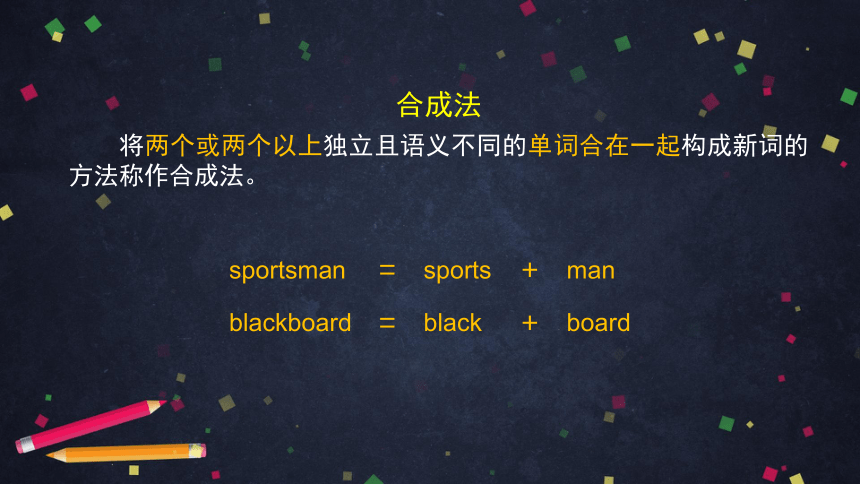
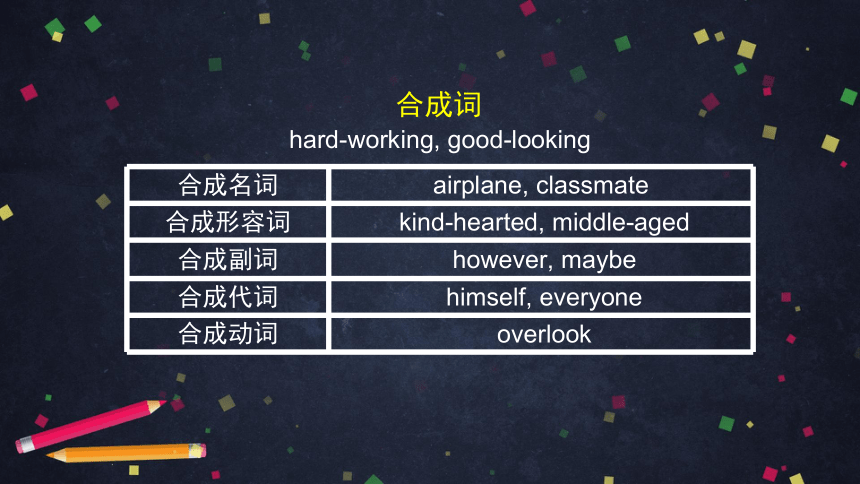
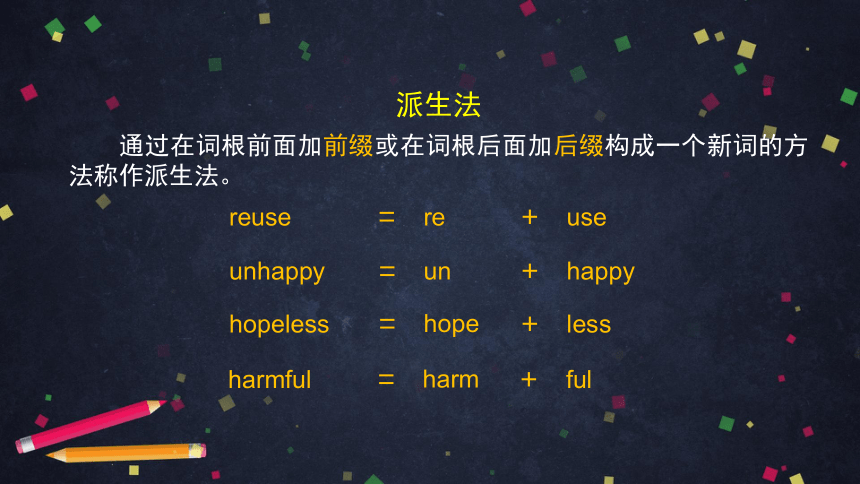
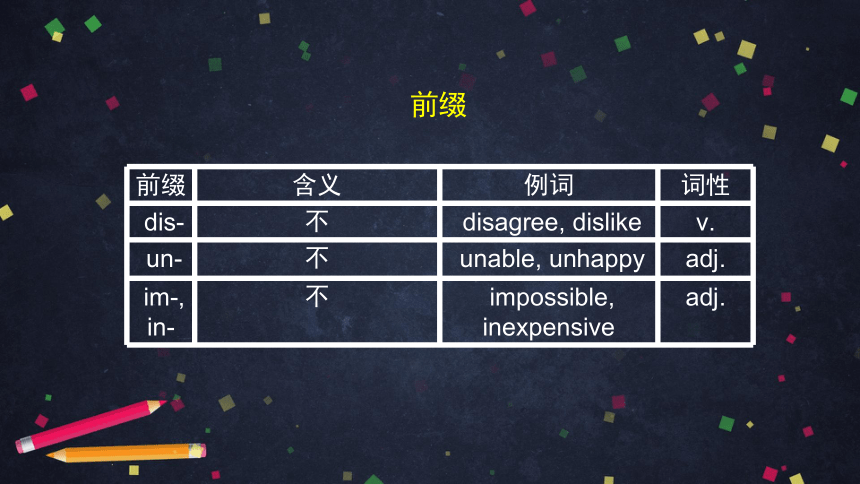
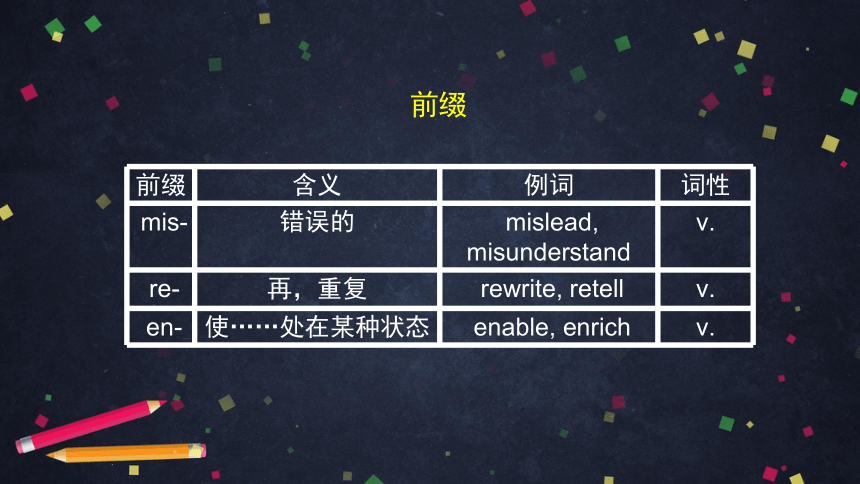
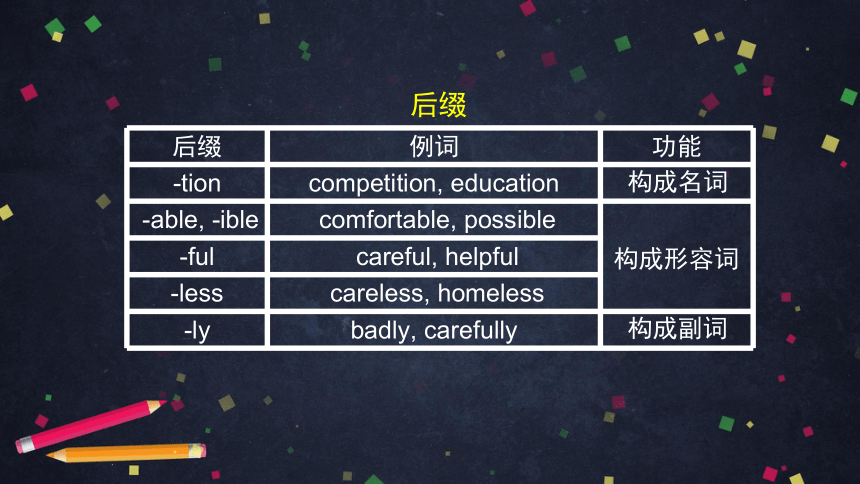
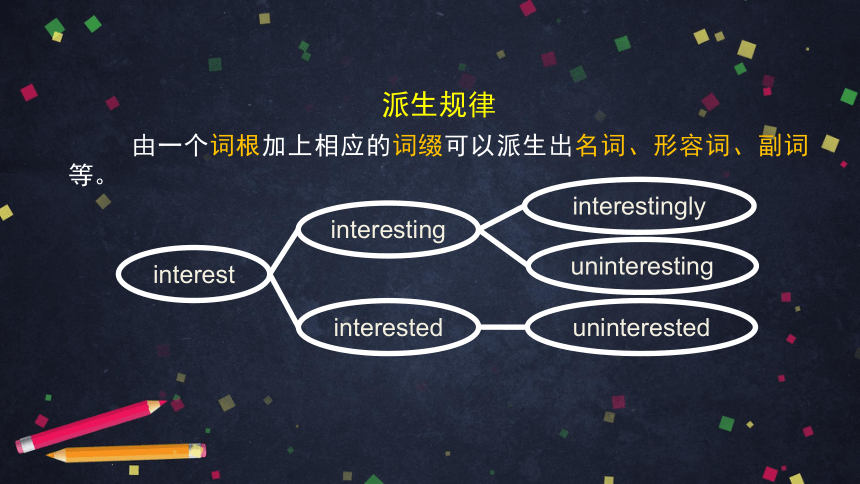
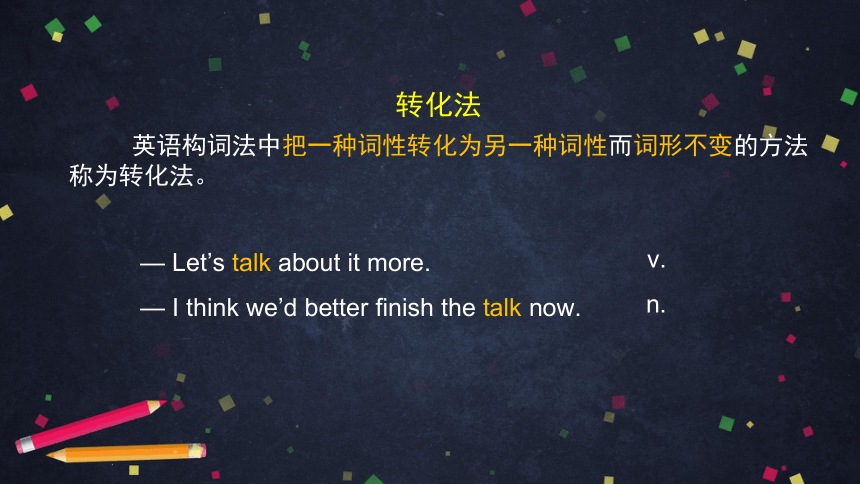
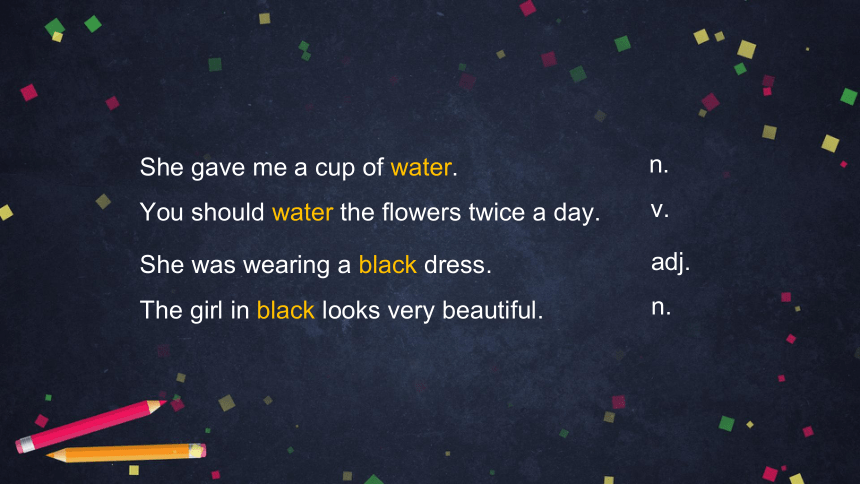
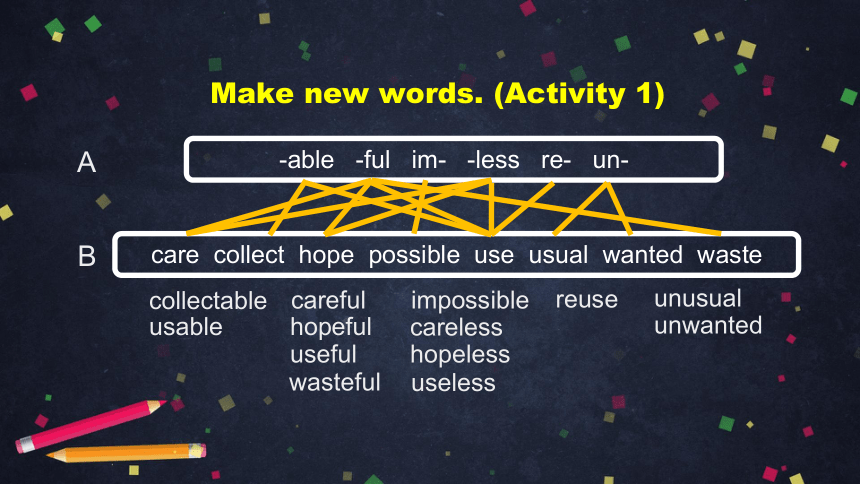
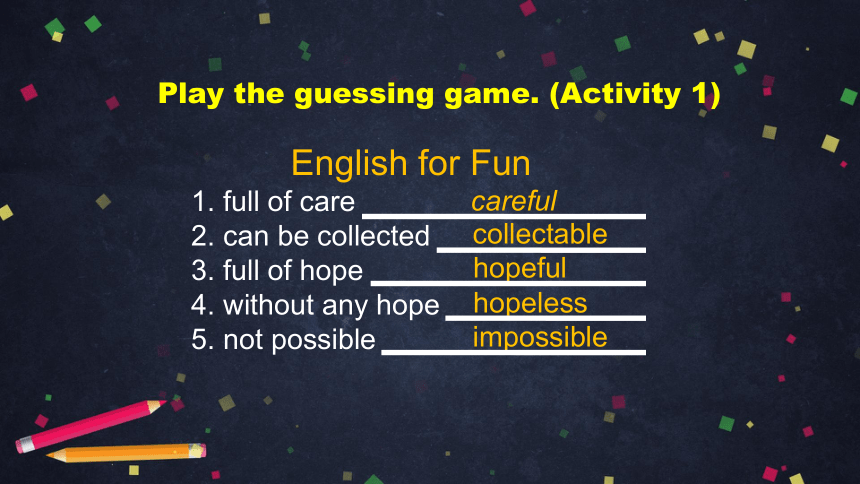
文档简介
M12 Unit 3 Language in use
初三年级 英语
将两个或两个以上独立且语义不同的单词合在一起构成新词的方法称作合成法。
合成法
sports
man
+
sportsman
=
black
board
+
blackboard
=
合成名词
airplane, classmate
合成形容词
kind-hearted, middle-aged
合成副词
however, maybe
合成代词
himself, everyone
合成动词
overlook
合成词
hard-working, good-looking
通过在词根前面加前缀或在词根后面加后缀构成一个新词的方法称作派生法。
派生法
re
use
+
reuse
=
un
happy
+
unhappy
=
hope
less
+
hopeless
=
harm
ful
+
harmful
=
前缀
含义
例词
词性
dis-
不
disagree, dislike
v.
un-
不
unable, unhappy
adj.
im-, in-
不
impossible, inexpensive
adj.
前缀
前缀
含义
例词
词性
mis-
错误的
mislead, misunderstand
v.
re-
再,重复
rewrite, retell
v.
en-
使……处在某种状态
enable, enrich
v.
前缀
后缀
后缀
例词
功能
-tion
competition, education
-able, -ible
comfortable, possible
-ful
careful, helpful
-less
careless, homeless
-ly
badly, carefully
构成形容词
构成副词
构成名词
派生规律
interest
interesting
interestingly
uninteresting
uninterested
interested
由一个词根加上相应的词缀可以派生出名词、形容词、副词等。
英语构词法中把一种词性转化为另一种词性而词形不变的方法称为转化法。
转化法
— Let’s talk about it more.
— I think we’d better finish the talk now.
v.
n.
She gave me a cup of water.
You should water the flowers twice a day.
She was wearing a black dress.
The girl in black looks very beautiful.
v.
n.
adj.
n.
Make new words. (Activity 1)
A
B
-able -ful im- -less re- un-
care collect hope possible use usual wanted waste
collectable
usable
careful
hopeful
useful
wasteful
impossible
careless
hopeless
useless
reuse
unusual
unwanted
Play the guessing game. (Activity 1)
English for Fun
1. full of care
2. can be collected
3. full of hope
4. without any hope
5. not possible
careful
collectable
hopeful
hopeless
impossible
Play the guessing game. (Activity 1)
English for Fun
6. not usual
7. without any use
8. use again
9. not wanted
10. making a lot of waste
unusual
useless
reuse
unwanted
wasteful
Complete the sentences with the words in the box. (Activity 2)
hopeful impossible reuse unhealthy wasteful
1. Polluted water is .
2. It is to throw so much food away.
3. If you look after things well, you may some of them later.
unhealthy
wasteful
reuse
4. It is to clean up the whole river in such a short time.
5. If we pay attention to pollution now, the future will be
.
impossible
hopeful
Complete the sentences with the words in the box. (Activity 2)
hopeful impossible reuse unhealthy wasteful
Complete the table. (Activity 3)
Noun
Verb
Adjective
Adverb
useful/useless
hope
hopefully/hopelessly
pollution
——
use
use
usefully/uselessly
hope
hopeful/hopeless
pollute
polluted/unpolluted
Noun
Verb
Adjective
Adverb
water
——
——
waste
——
——
usually/unusually
water
waste
wasteful/wasted
wastefully
usual/unusual
Complete the table. (Activity 3)
A is a card that you write on one side of and send to someone by post.
2. A is a room where you have classes at school.
3. A is a book that has one or more stories for children.
4. A is a black board that is used at school for writing on with chalk.
postcard
classroom
storybook
blackboard
Complete the sentences. (Activity 5)
A is a box that you keep your lunch in.
lunchbox
( )1. It is OK to throw used things away. Looking after
them takes a lot of time.
( )2. Do not throw away things made of glass, plastic
and paper, but recycle them when possible.
( )3. Take a bag when you go shopping.
Listen and check the true sentences.
(Activity 8)
( )4. Producing electricity and using oil will not cause
pollution.
( )5. Turn off lights when you do not need them.
( )6. Ride a bike or walk, and do not often drive your
car.
Listen and check the true sentences.
(Activity 8)
( )1. It is OK to throw used things away. Looking after
them takes a lot of time.
( )2. Do not throw away things made of glass, plastic
and paper, but recycle them when possible.
( )3. Take a bag when you go shopping.
Listen and check the true sentences.
(Activity 8)
T
T
a waste
F
( )4. Producing electricity and using oil will not cause
pollution.
( )5. Turn off lights when you do not need them.
( )6. Ride a bike or walk, and do not often drive your
car.
T
T
may
F
Listen and check the true sentences.
(Activity 8)
When is Earth Hour?
What do people do during Earth Hour?
3. When and where was the first Earth Hour held?
Around the world
Earth Hour
Earth Hour is held toward the end of March each year. During Earth Hour, people all across the world switch off the lights they do not need. They do this to show their awareness of climate change.
Around the world
Earth Hour
1. When is Earth Hour?
2. What do people do during Earth Hour?
Earth Hour is held toward the end of March each year. During Earth Hour, people all across the world switch off the lights they do not need. They do this to show their awareness of climate change.
1. It is held toward the end of March each year.
2. They switch off the lights they do not need.
Around the world
Earth Hour
The first Earth Hour was held in 2007 in Sydney, where more than 2.2 million people switched off their lights. Today, more and more cities are taking part in the event, such as Beijing, London, Rome and New York, and landmarks like the Empire State Building and the Golden Gate Bridge will go dark.
Around the world
Earth Hour
3. When and where was the first Earth Hour held?
3. When and where was the first Earth Hour held?
It was held in 2007 in Sydney.
Module task
Discussing what you can do about pollution
Step 1: Decide what kind of pollution you want to talk about.
Choose a subject that you care about the most. It could be
water pollution, air pollution, etc.
Find out more information about your subject. Look it up
on a website or in a book.
Step 2: Make a list.
List what you think about the problem and what can be done
on a piece of paper.
1. Help plant more trees.
2. Choose public transportation.
3. Turn off the lights when we don’t need them.
Module task
Discussing what you can do about pollution
Step 3: Make a poster.
Make a poster to tell people more information about the
pollution you care about the most.
Module task
Discussing what you can do about pollution
A sample poster
Air pollution
1. Help plant
more trees.
2. Choose public
transportation.
3. Turn off the lights
when we don’t
need them.
Homework
请你制作一张海报,介绍你最关心的污染问题。
Thank you!
初三年级 英语
将两个或两个以上独立且语义不同的单词合在一起构成新词的方法称作合成法。
合成法
sports
man
+
sportsman
=
black
board
+
blackboard
=
合成名词
airplane, classmate
合成形容词
kind-hearted, middle-aged
合成副词
however, maybe
合成代词
himself, everyone
合成动词
overlook
合成词
hard-working, good-looking
通过在词根前面加前缀或在词根后面加后缀构成一个新词的方法称作派生法。
派生法
re
use
+
reuse
=
un
happy
+
unhappy
=
hope
less
+
hopeless
=
harm
ful
+
harmful
=
前缀
含义
例词
词性
dis-
不
disagree, dislike
v.
un-
不
unable, unhappy
adj.
im-, in-
不
impossible, inexpensive
adj.
前缀
前缀
含义
例词
词性
mis-
错误的
mislead, misunderstand
v.
re-
再,重复
rewrite, retell
v.
en-
使……处在某种状态
enable, enrich
v.
前缀
后缀
后缀
例词
功能
-tion
competition, education
-able, -ible
comfortable, possible
-ful
careful, helpful
-less
careless, homeless
-ly
badly, carefully
构成形容词
构成副词
构成名词
派生规律
interest
interesting
interestingly
uninteresting
uninterested
interested
由一个词根加上相应的词缀可以派生出名词、形容词、副词等。
英语构词法中把一种词性转化为另一种词性而词形不变的方法称为转化法。
转化法
— Let’s talk about it more.
— I think we’d better finish the talk now.
v.
n.
She gave me a cup of water.
You should water the flowers twice a day.
She was wearing a black dress.
The girl in black looks very beautiful.
v.
n.
adj.
n.
Make new words. (Activity 1)
A
B
-able -ful im- -less re- un-
care collect hope possible use usual wanted waste
collectable
usable
careful
hopeful
useful
wasteful
impossible
careless
hopeless
useless
reuse
unusual
unwanted
Play the guessing game. (Activity 1)
English for Fun
1. full of care
2. can be collected
3. full of hope
4. without any hope
5. not possible
careful
collectable
hopeful
hopeless
impossible
Play the guessing game. (Activity 1)
English for Fun
6. not usual
7. without any use
8. use again
9. not wanted
10. making a lot of waste
unusual
useless
reuse
unwanted
wasteful
Complete the sentences with the words in the box. (Activity 2)
hopeful impossible reuse unhealthy wasteful
1. Polluted water is .
2. It is to throw so much food away.
3. If you look after things well, you may some of them later.
unhealthy
wasteful
reuse
4. It is to clean up the whole river in such a short time.
5. If we pay attention to pollution now, the future will be
.
impossible
hopeful
Complete the sentences with the words in the box. (Activity 2)
hopeful impossible reuse unhealthy wasteful
Complete the table. (Activity 3)
Noun
Verb
Adjective
Adverb
useful/useless
hope
hopefully/hopelessly
pollution
——
use
use
usefully/uselessly
hope
hopeful/hopeless
pollute
polluted/unpolluted
Noun
Verb
Adjective
Adverb
water
——
——
waste
——
——
usually/unusually
water
waste
wasteful/wasted
wastefully
usual/unusual
Complete the table. (Activity 3)
A is a card that you write on one side of and send to someone by post.
2. A is a room where you have classes at school.
3. A is a book that has one or more stories for children.
4. A is a black board that is used at school for writing on with chalk.
postcard
classroom
storybook
blackboard
Complete the sentences. (Activity 5)
A is a box that you keep your lunch in.
lunchbox
( )1. It is OK to throw used things away. Looking after
them takes a lot of time.
( )2. Do not throw away things made of glass, plastic
and paper, but recycle them when possible.
( )3. Take a bag when you go shopping.
Listen and check the true sentences.
(Activity 8)
( )4. Producing electricity and using oil will not cause
pollution.
( )5. Turn off lights when you do not need them.
( )6. Ride a bike or walk, and do not often drive your
car.
Listen and check the true sentences.
(Activity 8)
( )1. It is OK to throw used things away. Looking after
them takes a lot of time.
( )2. Do not throw away things made of glass, plastic
and paper, but recycle them when possible.
( )3. Take a bag when you go shopping.
Listen and check the true sentences.
(Activity 8)
T
T
a waste
F
( )4. Producing electricity and using oil will not cause
pollution.
( )5. Turn off lights when you do not need them.
( )6. Ride a bike or walk, and do not often drive your
car.
T
T
may
F
Listen and check the true sentences.
(Activity 8)
When is Earth Hour?
What do people do during Earth Hour?
3. When and where was the first Earth Hour held?
Around the world
Earth Hour
Earth Hour is held toward the end of March each year. During Earth Hour, people all across the world switch off the lights they do not need. They do this to show their awareness of climate change.
Around the world
Earth Hour
1. When is Earth Hour?
2. What do people do during Earth Hour?
Earth Hour is held toward the end of March each year. During Earth Hour, people all across the world switch off the lights they do not need. They do this to show their awareness of climate change.
1. It is held toward the end of March each year.
2. They switch off the lights they do not need.
Around the world
Earth Hour
The first Earth Hour was held in 2007 in Sydney, where more than 2.2 million people switched off their lights. Today, more and more cities are taking part in the event, such as Beijing, London, Rome and New York, and landmarks like the Empire State Building and the Golden Gate Bridge will go dark.
Around the world
Earth Hour
3. When and where was the first Earth Hour held?
3. When and where was the first Earth Hour held?
It was held in 2007 in Sydney.
Module task
Discussing what you can do about pollution
Step 1: Decide what kind of pollution you want to talk about.
Choose a subject that you care about the most. It could be
water pollution, air pollution, etc.
Find out more information about your subject. Look it up
on a website or in a book.
Step 2: Make a list.
List what you think about the problem and what can be done
on a piece of paper.
1. Help plant more trees.
2. Choose public transportation.
3. Turn off the lights when we don’t need them.
Module task
Discussing what you can do about pollution
Step 3: Make a poster.
Make a poster to tell people more information about the
pollution you care about the most.
Module task
Discussing what you can do about pollution
A sample poster
Air pollution
1. Help plant
more trees.
2. Choose public
transportation.
3. Turn off the lights
when we don’t
need them.
Homework
请你制作一张海报,介绍你最关心的污染问题。
Thank you!
同课章节目录
- Module 1 Wonders of the world
- Unit 1 It's more than 2,000 years old.
- Unit 2 The Grand Canyon was not just big.
- Unit 3 Language in use
- Module 2 Public holidays
- Unit 1 My family always go somewhere interesting a
- Unit 2 We have celebrated the festival since the f
- Unit 3 Language in use
- Module 3 Heroes
- Unit 1 She trained hard,so she became a great play
- Unit 2There were few doctors, so he had to work ve
- Unit 3 Language in use
- Module 4 Home alone
- Unit 1 I can look after myself, although it won’t
- Unit 2 I became so bored with their orders that I
- Unit 3 Language in use
- Module 5 Museums
- Unit 1 Don't cross that rope!
- Unit 2 If you ever go to London, make sure you vis
- Unit 3 Language in use
- Module 6 Problems
- Unit 1 If I start after dinner, I'll finish it be
- Unit 2 If you tell him the truth now, you will sho
- Unit 3 Language in use
- Revision Module A
- Module 7 Great books
- Unit 1 We're still influenced by Confucius's idea
- Unit 2 It is still read and loved.
- Unit 3 Language in use
- Module 8 Sports life
- Unit 1 Daming wasn't chosen for the team last time
- Unit 2 He was invited to competitions around the w
- Unit 3 Language in use
- Module 9 Great inventions
- Unit 1 Will computers be used more than books in t
- Unit 2 Will books be replaced by the Internet?
- Unit 3 Language in use
- Module 10 Australia
- Unit 1 I have some photos that I took in Australia
- Unit 2 The game that they like most is Australian
- Unit 3 Language in use
- Module 11 Photos
- Unit 1 He's the boy who won the photo competition
- Unit 2 The photo which we liked best was taken by
- Unit 3 Language in use
- Module 12 Save our world
- Unit 1 If everyone starts to do something, the wor
- Unit 2 Repeat these three words daily: reduce, reu
- Unit 3 Language in use
- Revision Module B
